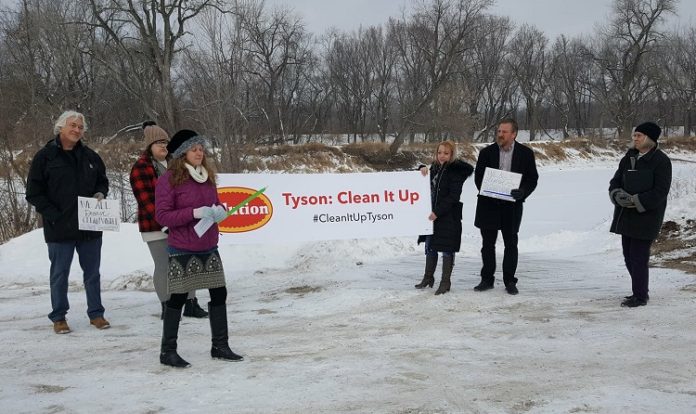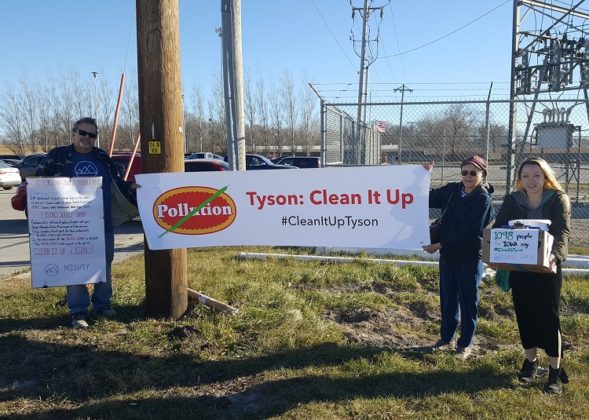
 DES MOINES — Shareholders in Tyson Foods Inc., the largest meat producer in the U.S., gathered last week in Springdale, Ark., for their annual meeting, and among other business they roundly rejected a resolution urging the company to implement a water stewardship policy.
DES MOINES — Shareholders in Tyson Foods Inc., the largest meat producer in the U.S., gathered last week in Springdale, Ark., for their annual meeting, and among other business they roundly rejected a resolution urging the company to implement a water stewardship policy.
The resolution was proposed by the Tri-State Coalition for Responsible Investment, which represents more than a dozen groups holding Tyson stock, such as the American Baptist Home Mission Society, ACTIAM N.L., the Adrian Dominican Sisters Portfolio Advisory Board, As You Sow, the Daughters of Charity and nine others.
Noting “that agricultural run-off from feed crops produced to raise animal agriculture is the leading cause of the Dead Zone in the Gulf, and that meat companies such as Tyson are responsible,” the shareholder resolution called for a water stewardship policy containing “requirements for leading practices for nutrient management and pollutant limits throughout direct operations, contract farms, and feed suppliers, with a focus on verifiably reducing nitrate contamination.”
The call for Tyson to control its polluting livestock and feed producers dovetailed with similar calls recently made by Mighty Earth Des Moines, a coalition of some 20 groups representing business, agricultural and environmental communities around Iowa. Mighty Earth is part of a nationwide campaign to push Tyson Foods to address the widespread water contamination caused by its supply chain.
Tyson’s power in the industry is indisputable. As the Walmart of meat production, Tyson Foods produces one out of every five pounds of meat on the planet, employing some 114,000 people in about 100 processing plants nationwide. Tyson’s plants are supplied with chickens, cows and pigs by about 11,000 contract livestock producers.
At a press conference Thursday, Mighty Earth organizer Jessye Waxman urged the Tyson shareholders to approve the water stewardship resolution. Mighty Earth released a research report last summer claiming Tyson Foods is a primary driver of water pollution across the U.S., and nine communities in regions heavily contaminated by nitrates, including Des Moines, have since joined the #CleanItUpTyson campaign and petitioned the meat-processing giant to adopt sustainable agricultural practices.
The Tri-State Coalition’s resolution appealed to the self-interest of shareholders in warning that Tyson’s failure to adopt a water stewardship policy exposed the company to financial risks, reputational risks and “risks to community acceptance and its social license to operate as a result of poor water stewardship.”
Ignoring the Tri-State Coalition’s warnings and the Mighty Earth petition and instead following the recommendations of the Tyson Board of Directors, 84 percent of the company’s shareholders voted to reject the water stewardship resolution. The Tyson Limited Partnership controlled 72 percent of the vote. Excluding the Tyson Limited Partnership shares, support for this resolution was more than 60 percent, according to the Tri-State Coalition.
In recommending a no vote, a statement from the Tyson board said the company has already “implemented a wide range of initiatives to reduce risks of water contamination” and has “appropriately and adequately” addressed the resolution’s concerns, and so “the adoption of another policy is unnecessary and duplicative.”
Mary Beth Gallagher, executive director of the Tri-State Coalition for Responsible Investment, said Tyson “has not changed their procedures since we first filed this resolution in 2015, and they have continued to experience water contamination incidents that have resulted in fines, reputational harm and damage to their social license to operate.”
Gallagher said many “shareholders are not satisfied with the board’s response that the company has sufficient procedures in place to manage water risks.”
In Des Moines, Waxman was joined at Thursday’s Mighty Earth press conference by Susan Heathcote, water program director on the Iowa Environmental Council, Bill Stowe, CEO of the Des Moines Water Works, and Adam Mason, state policy director for Iowa Citizens for Community Improvement.
Standing alongside the frozen Des Moines River in Water Works Park, Heathcote said that while the #CleanItUpTyson campaign focuses on reducing hypoxia in the Gulf of Mexico, nutrient reduction also pays benefits in public health and quality of life right here at home.
Heathcote said the trend in private wells with unsafe levels of nitrate statewide has been increasing, with as much as 25 percent of wells in areas of the state that rely on vulnerable shallow wells exceeding the recommended safe nitrate level. The cost to families and communities of a new well or a replacement water supply can be immense, she said.
In 2007 Heathcote was appointed to the Iowa Environmental Protection Commission, which oversees the work of the Iowa Department of Natural Resources. The Iowa Farm Bureau Federation claimed in a lawsuit that Heathcote’s appointment involved a conflict of interest because she was a lobbyist for environmental-protection interests with an “unalterably closed mind” to the interests of industrial agribusiness. The suit was dismissed on appeal.
Heathcote said recent research suggests the adverse human health impacts from elevated nitrate levels in drinking water have possible connections to increased risks for bladder cancer and birth defects from prenatal exposure, along with the well known blue baby syndrome. Nutrient pollution also causes harmful algal blooms that endanger human and animal health and discourage visitors from enjoying Iowa’s recreational assets.
The Des Moines Water Works’ Stowe said the Iowa Legislature has so far proved itself incapable of addressing nutrient reduction in a serious way, so bringing pressure to bear on the agricultural polluters themselves is a sensible alternative.
“Events like today’s,” he said, “where we’re talking about moving into the supply chain and getting consumers to be educated, getting Tyson, Smithfield and others, who are major players out there, to connect their contracts with conservation practices — may move the ball forward because the state certainly isn’t doing it.”
Stowe predicted in October at a Mighty Earth event that the degradation of Iowa’s water will eventually be reversed.
“The Farm Bureau and their allies are not going to have their way all the time,” he said. “That’s changing. We’ve never had this kind of open conversation about sustainable farming and moratoria. Ten years ago we wouldn’t have had it. So the tides are turning. They’re not turning as quickly as many of us would want them to, but we’re not going to go away.”
In other Tyson Foods Inc. news, the company announced this week that its employees will receive one-time bonuses as a result of the company’s $300 million in tax savings following the recent cut in the federal corporate tax rate.
Tyson President and CEO Tom Hayes said in an email to employees that full-time workers who do not receive an annual bonus will get $1,000 and part-time workers who receive no annual bonus will get $500. Hayes said the remaining tax windfall will be used for employee training and education, including teaching ESL and GED classes.
Tyson’s corporate munificence follows similar tricklings down from other big companies, such as Walmart, Starbucks and Disney, which have recently shaken their superflux to employees.




















